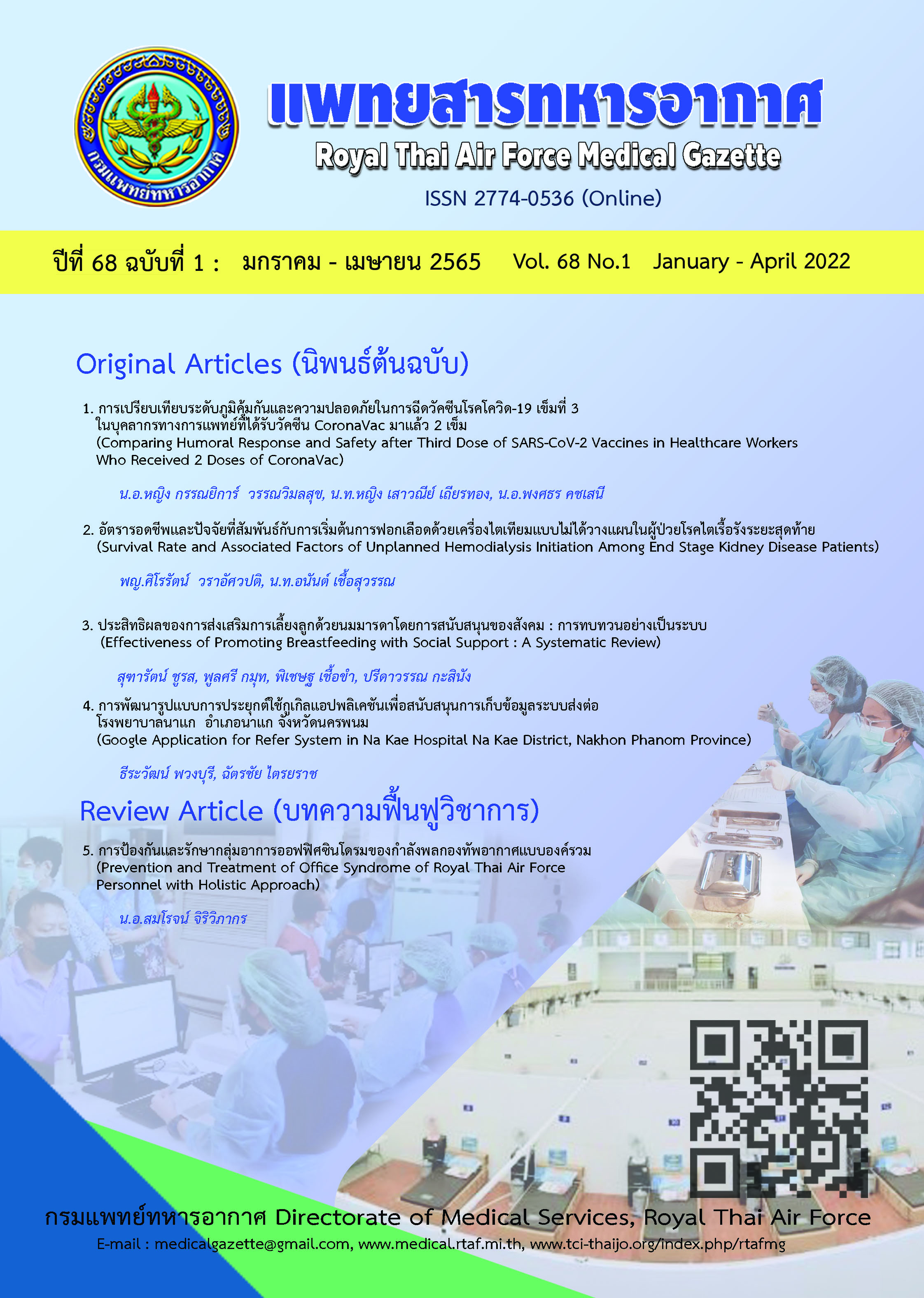Comparing Humoral Response and Safety after Third Dose of SARS-CoV-2 Vaccines in Healthcare Workers Who Received 2 Doses of CoronaVac
Main Article Content
Abstract
Background: Inactivated SARS-CoV-2 vaccines manufactured by Sinovac Life Sciences (CoronaVac) has been widely used in Thai healthcare workers. However, the emergence of delta variance raises the concern of immunity induced by CoronaVac. Therefore, a third dose booster using viral vector or mRNA vaccine has been recommended in frontline healthcare workers who received 2 doses of CoronaVac. This study aims to compare the level of anti-spike protein response and safety after third dose boosters in medical personnel of Royal Thai Air Force Hospital (SIKAN).
Methods: Immunoglobulin class G (IgG) against SARS-CoV-2 spike protein were measured before and 4 weeks after booster dose in medical personnel who volunteered to take part in this study.
Results: A total of 131 medical personnel who received booster doses of vaccine were included into this study (57 with viral vector vaccine, AstraZeneca and 74 with mRNA vaccine, Pfizer-BioNTech). There were no group differences regarding baseline characteristics, except for age that participants who received mRNA vaccine were significant younger. The anti-spike IgG antibody levels were significant increased in both groups, which the mRNA vaccinated group had increased more than the viral vector group (22,663 ± 10,999.5 vs. 9,900.5 ± 10,788.9 AU/ml, p < 0.001). Adverse events following immunization (AEFI) were found to be similar in both groups without any severe symptoms.
Conclusion: In healthcare professionals who had received two doses of CoronaVac, 3rd dose booster from both viral-vector and mRNA vaccines were effective, with the mRNA vaccine providing higher levels of immunity. The adverse events reported were mild to moderate.
Article Details

This work is licensed under a Creative Commons Attribution-NonCommercial-NoDerivatives 4.0 International License.
บทความที่ได้รับการตีพิมพฺเป็นลิขสิทธิ์ของวารสาร
References
กรมควบคุมโรค. รายงาน COVID-19 ประจำวัน ข้อมูลประจำประเทศไทย. 24 กรกฎาคม 2564.
[Available from: https://ddc.moph.go.th/viralpneumonia/situation.php]
WHO. Coronavirus disease (COVID-19): Vaccines. 2020.
[Available from: https://www.who.int/news-room/questions-and-answers/item/coronavirus-disease-(covid-19)-vaccines]
กรมควบคุมโรค แนวทางการให้วัคซีนโควิด 19 ในสถานการณ์การระบาด ปี 2564 ของประเทศไทย ฉบับปรับปรุง ครั้งที่ 2 สิงหาคม 2564
[Available from: https://ddc.moph.go.th/vaccine-covid19/getFiles/11/1628849610213.pdf]
Tanriover MD, Doğanay HL, Akova M, et al. Efficacy and safety of an inactivated whole-virion SARS-CoV-2 vaccine (CoronaVac):
interim results of a double-blind, randomised, placebo-controlled, phase 3 trial in Turkey. Lancet 2021;398:213-22.
Jara A, Undurraga EA, González C, et al. Effectiveness of an Inactivated SARS-CoV-2 Vaccine in Chile. N Engl J Med. 2021;385(10):875-
Poovorawan Y. Unpublished data [Available from: https://www.facebook.com/photo?
fbid=6018865244822709&set=a.192552250787400]
Immunoassay for the quantitative determination of antibodies to the SARS-CoV-2 spike protein [Available from:
https://diagnostics.roche.com/global/en/products/params/elecsys-anti-sars-cov-2-s.html.]
ศูนย์วิจัยคลินิก คณะแพทยศาสตร์ศิริราชพยาบาล รายงานผลการวิจัยเบื้องต้นในการศึกษาความปลอดภัยและการตอบสนองทางภูมิคุ้มกันจากการฉีดวัคซีน
กระตุ้นเข็ม 3 ในผู้ที่ได้รับวัคซีนซิโนแวคครบสองเข็ม [Available from: https://sicres.org/2021/09/13/covid19-vaccine-booster/]


